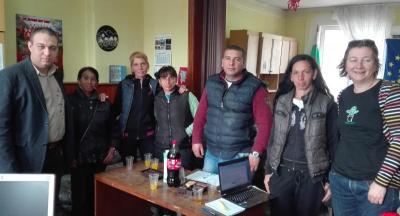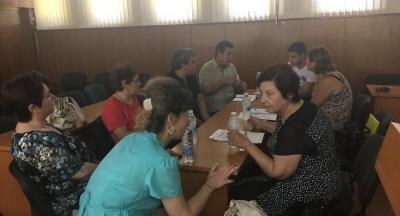Sopot
*Disclaimer: The information and views set out in this page do not necessarily reflect the official opinion of the Council of Europe and/or the European Commission. Neither the Council of Europe, the European Commission nor any person acting on their behalf may be held responsible for the use which may be made of the information contained therein.
Sopot Municipality is situated in Central Bulgaria, the North-West part of Plovdiv region, neighboring with Karlovo and Troyan municipalities. The municipality includes the town of Sopot and Anevo village.
Sopot has two Roma neighborhoods: Manastirska reka and Bozovo. The Roma population in Bozovo are in a relatively good social level and there is a good infrastructure. On the other side, the Manastrirska reka neighborhood has several major issues that need to be addressed and the local community and the local authorities need to find solutions for:
- Illegal built houses
- Lack of electricity
- Lack of asphalt/ sidewalks on the streets
- Lack of street lights
- High rates of illiteracy and lower education among adults
- Early marriages and domestic violence
The ROMACT Process
Sopot municipality joined the ROMACT program in September 2016 with the signature of the letter of agreement. In October 2016, the Taskforce for Roma Inclusion was created. The Municipality of Sopot adopted the Action plan of Sopot Municipality to implement the Regional strategy for integration of Bulgarian citizens with Roma origin and other citizens in vulnerable social situation (2015-2017).
The long-term priorities identified by the Community Action Group are:
* To prevent cases of dropping out of school and drug use among Roma young people;
* To reduce or remove fees for all children in kindergartens;
* To solve Roma adults’ illiteracy through complementary education;
* To create a multiethnic educational environment in schools in order to reduce racism;
* To appoint at least one mediator in the local administration;
* To provide land with the right of construction / to legalize Roma houses which are on municipal land;
* To improve infrastructure in the neighborhoods.
Despite the fact that the Joint Action Plan (Municipal Action Plan for Roma Inclusion) was approved only by the Mayor but not by the Local Council, following measures to solve problems in Roma community were taken:
Project: Rehabilitation of public street lighting and improved garbage collection on Manarstika Reka Street
Beneficiaries: 400 Roma persons
Budget: local authority
Project: Reduction of kindergarten fees (50%)
Beneficiaries: 300 children including 40 Roma children
Budget: local authority
Progress: Started in February 2018 for unlimited period
Trainings provided by ROMACT experts :
Community Action Groups (CAG):
* Training of the local authorities’ representatives to address short-term priorities of the Roma community;
* Training of taskforce members on applying an interdisciplinary approach addressing complex issues of Roma community;
* Review the process of planning and implementing short and medium term activities and preparing concrete actions;
* Training session with CAG members on advocacy - communication techniques & negotiation with the local administration and institutions;
* Training for CAG members on understanding local governance and citizen participation;
* Training session and moderation between the CAG and LA about addressing the problem of illegal houses;
* Team building of Taskforce members/ Supporting the Taskforce in setting up plan of action.
Local Authorities (LA):
* Addressing drug delivery and use in the Roma neighbourhoods.



